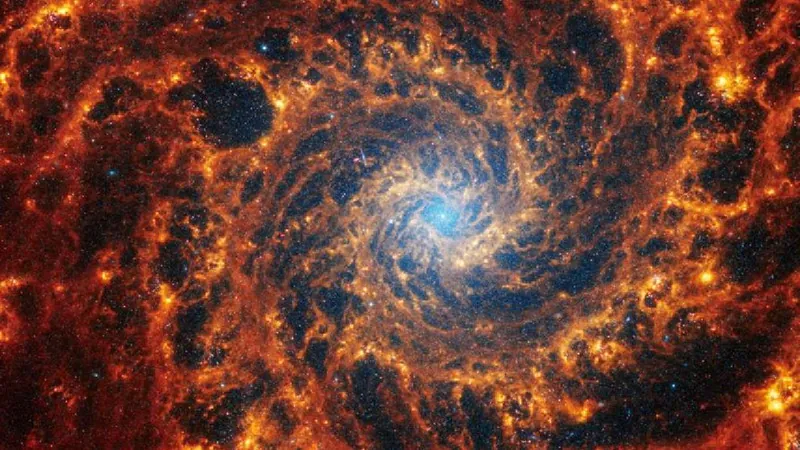
Breaking News: Webb Telescope Reveals Universe is Expanding Much Faster Than Expected – Here’s What It Means!
2024-12-09
Author: Wei
Introduction
In a groundbreaking revelation from NASA's James Webb Space Telescope, scientists have confirmed that the universe is expanding at an astonishingly rapid pace, about 8% faster than previously anticipated. This surprising finding has left astrophysicists scratching their heads, pondering the possible involvement of elusive cosmic elements known as dark matter and dark energy.
The Role of the Webb Telescope
The Webb telescope, which boasts remarkable capabilities beyond its predecessor, the Hubble Space Telescope, has collected two years' worth of data that reinforces earlier observations. This phenomenon, famously known as the Hubble Tension, suggests that our current understanding of the universe's initial conditions and its evolution over billions of years is lacking.
Expert Insights
“After a decade of turbulence in astrophysics, we now find ourselves confronted with undeniable proof from Webb—that the universe is expanding faster than our best theories can account for,” stated Adam Riess, a prominent astrophysicist at Johns Hopkins University and the lead author of the study recently published in the Astrophysical Journal. Riess, who won the Nobel Prize in Physics in 2011 for his co-discovery of the universe's accelerating expansion, underscored the critical gap in our comprehension of the cosmos, attributing this shortfall to the mysterious dark matter and dark energy, which collectively make up a staggering 96% of the universe.
Understanding Dark Matter and Dark Energy
Both Riess and his co-author, Siyang Li, highlight the need for a potential overhaul of our cosmic models. Li emphasized, “While it’s challenging to identify specific changes at this stage, we must acknowledge the indications that our current theories may be incomplete.” So, what exactly are dark matter and dark energy? Dark matter is a hidden form of matter that constitutes about 27% of the universe. We cannot see it directly, yet its existence is inferred from its gravitational influences on visible matter, such as stars and galaxies—making up a mere 5% of the universe’s total composition. Dark energy, on the other hand, accounts for approximately 69% of the universe and is thought to permeate all of space, accelerating the universe's expansion in defiance of gravity.
Hypotheses and Measurements
Interestingly, various hypotheses may shed light on this unexpected expansion rate, ranging from modifications in our understanding of dark matter and dark energy, to the behavior of neutrinos—ghostly particles that may possess unforeseen effects on cosmic growth. In their research, the team utilized three distinct methods to measure a critical parameter known as the Hubble constant, which indicates the rate of expansion in kilometers per second per megaparsec (a megaparsec equals 3.26 million light-years). Their findings revealed a Hubble constant value averaging around 73, significantly diverging from the traditional value of 67 to 68.
Historical Context and Future Questions
This revelation harkens back to the Big Bang, a colossal event believed to have occurred 13 to 14 billion years ago, marking the universe's inception. The continual expansion has been an established fact since a key discovery in 1998, where scientists unveiled that not only was the universe expanding, but it was accelerating due to dark energy’s influence. As researchers continue to analyze Webb's extensive data—covering roughly a third of the galaxies observed by Hubble—one pressing question remains: How do we solve the Hubble Tension mystery? “Further analysis is essential to accurately quantify this discrepancy. Is this mismatch a modest 4-5% or a more significant 10-12%? We also need to understand its persistence across cosmic timelines,” Riess concluded.
Conclusion
The universe continues to hold many secrets, and as scientists delve deeper into this cosmic conundrum, we may soon uncover truths that could redefine our understanding of existence itself. Stay tuned for the latest updates as we unravel the mysteries of our universe!



 Brasil (PT)
Brasil (PT)
 Canada (EN)
Canada (EN)
 Chile (ES)
Chile (ES)
 España (ES)
España (ES)
 France (FR)
France (FR)
 Hong Kong (EN)
Hong Kong (EN)
 Italia (IT)
Italia (IT)
 日本 (JA)
日本 (JA)
 Magyarország (HU)
Magyarország (HU)
 Norge (NO)
Norge (NO)
 Polska (PL)
Polska (PL)
 Schweiz (DE)
Schweiz (DE)
 Singapore (EN)
Singapore (EN)
 Sverige (SV)
Sverige (SV)
 Suomi (FI)
Suomi (FI)
 Türkiye (TR)
Türkiye (TR)